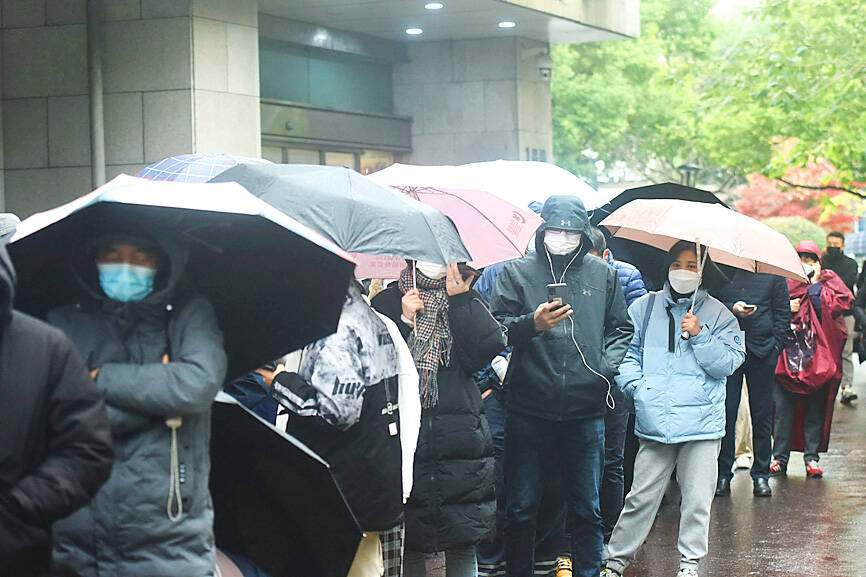China set out urgent plans to protect rural communities from COVID-19 yesterday, as millions of city-dwellers planned holidays for the first time in years after Beijing abandoned its stringent system of lockdowns and travel curbs.
There is particular concern about China’s hinterland in the run up to China’s Lunar New Year holiday starting on Jan. 22.
Rural areas are likely to be inundated with travelers returning to their hometowns and villages, which have had little exposure to the virus during the three years since the pandemic started.

Photo: AFP
The Chinese National Health Commission yesterday said it was ramping up vaccinations and building stocks of ventilators, essential drugs and test kits in rural areas. It also advised travelers to reduce contact with elderly relatives.
China’s international borders remain largely shut, but recent decisions to abandon testing prior to domestic travel and disable apps that tracked people’s journey history have allowed people to move around the country.
One of China’s most populous provinces, Henan, canceled all holidays for healthcare staff until the end of March to ensure “a smooth transition” as COVID-19 restrictions ease, state media reported on Thursday.
Multiple cities across the country of 1.4 billion people opened new vaccination sites to encourage the public to take booster shots, the state-run Global Times newspaper reported.
“Go all out” was the message from China’s state asset regulator in a statement late on Thursday that urged government-owned drugmakers to ensure supplies of medicines related to COVID-19 would meet “the rapid increase” in demand.
SF Express, one of China’s largest courier services, said on its official WeChat account that it had sent workers from across the country to keep deliveries going in Beijing amid staff shortages and soaring demand.
It had started a “fast track” for emergency shipments such as medicines and daily necessities, with demand in the capital 300 percent above normal levels, it said.
The COVID-19 scare in China also led people in Hong Kong, Macau and in some neighborhoods in Australia to search for fever medicines and test kits for family and friends in China.
Many Chinese are resigned to catching the virus at some point.
“Everyone will get it, I guess,” a 29-year-old Beijing resident surnamed Du said.
Analysts said that China could pay a price for letting the virus rapidly rip through a population that lacks “herd immunity” and has low vaccination rates among the elderly.
That has dented the prospects for near-term growth, even if the opening up should eventually help revive China’s battered economy, they said.
JPMorgan yesterday revised down its expectations for China’s growth this year to 2.8 percent, which is well below China’s official target of 5.5 percent, and would mark one of China’s worst performances in about half a century.
“Arduous efforts” are needed to sustain the recovery in growth due to an adverse external environment and the global economy’s loss of momentum, the Chinese National Development and Reform Commission said.

MONEY GRAB: People were rushing to collect bills scattered on the ground after the plane transporting money crashed, which an official said hindered rescue efforts A cargo plane carrying money on Friday crashed near Bolivia’s capital, damaging about a dozen vehicles on highway, scattering bills on the ground and leaving at least 15 people dead and others injured, an official said. Bolivian Minister of Defense Marcelo Salinas said the Hercules C-130 plane was transporting newly printed Bolivian currency when it “landed and veered off the runway” at an airport in El Alto, a city adjacent to La Paz, before ending up in a nearby field. Firefighters managed to put out the flames that engulfed the aircraft. Fire chief Pavel Tovar said at least 15 people died, but

LIKE FATHER, LIKE DAUGHTER: By showing Ju-ae’s ability to handle a weapon, the photos ‘suggest she is indeed receiving training as a successor,’ an academic said North Korea on Saturday released a rare image of leader Kim Jong-un’s teenage daughter firing a rifle at a shooting range, adding to speculation that she is being groomed as his successor. Kim’s daughter, Ju-ae, has long been seen as the next in line to rule the secretive, nuclear-armed state, and took part in a string of recent high-profile outings, including last week’s military parade marking the closing stages of North Korea’s key party congress. Pyongyang’s official Korean Central News Agency (KCNA) released a photo of Ju-ae shooting a rifle at an outdoor shooting range, peering through a rifle scope

South Korea would soon no longer be one of the few countries where Google Maps does not work properly, after its security-conscious government reversed a two-decade stance to approve the export of high-precision map data to overseas servers. The approval was made “on the condition that strict security requirements are met,” the South Korean Ministry of Land, Infrastructure and Transport said. Those conditions include blurring military and other sensitive security-related facilities, as well as restricting longitude and latitude coordinates for South Korean territory on products such as Google Maps and Google Earth, it said. The decision is expected to hurt Naver and Kakao

India and Canada yesterday reached a string of agreements, including on critical mineral cooperation and a “landmark” uranium supply deal for nuclear power, the countries’ leaders said in New Delhi. The pacts, which also covered technology and promoting the use of renewable energy, were announced after Indian Prime Minister Narendra Modi and Canadian Prime Minister Mark Carney hailed a fresh start in the relationship between their nations. “Our ties have seen a new energy, mutual trust and positivity,” Modi said. Carney’s visit is a key step forward in ties that effectively collapsed in 2023 after Ottawa accused New Delhi